Rye Barcott's Blog, page 7
April 1, 2020
Personal Protective Equipment (PPE)- COVID 19 Response
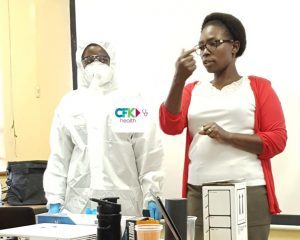
Early last week, CFK’s Clinic Staff and Community Health Volunteers received training from the CDC (pictured here). They are putting that training to work debunking myths and promoting positive hygiene education throughout the community. Staff are installing handwashing stations throughout Kibera and are now expanding to individual households.
As with many regions globally, Kenya faces a severe shortage of medical protective gear for frontline responders. We were fortunate to have Susan Tilson, a good Samaritan and social entrepreneur based in Nairobi, offer her services to locally manufacture high-quality, reusable face masks. This weekend, CFK received our first shipment of 800 masks with another 200 on the way. Susan made a lovely video that shows the process.
https://carolinaforkibera.org/wp-content/uploads/2020/03/VIDEO-2020-03-24-13-55-54.mp4
Donate now to support CFK’s frontline health care staff working to stop the spread of COVID-19 in Kibera. Your donation will directly support personal protective equipment, hand washing stations, soap and food and supply deliveries to our most vulnerable beneficiaries.
The post Personal Protective Equipment (PPE)- COVID 19 Response appeared first on Carolina for Kibera.
November 27, 2019
CFK’s Faces of Brighter Futures | Eunice’s Story
“When I was a kid I wanted to be a journalist…”, Eunice shared her reborn aspirations of taking journalism classes after she passes the KCSE (Kenya Certificate of Secondary Education) and working towards her degree.
Meet Eunice
Eunice is 19 – she’s known to many as sister, daughter, and mother, but these are only a few of the roles that Eunice plays. When she speaks to us about her future, her smile lights up the room, but her goal of becoming a journalist hasn’t always seemed achievable.
In 2013 Eunice lost her mother and became responsible for the wellbeing of her three younger siblings because her father was not employed. As the eldest child, she was expected to work to help cover her family’s rent and food expenses. This didn’t leave much money for Eunice’s own needs, and when she started her period she had no money for pads and other basic necessities.
In the wake of this hard time she met a man who promised to provide money and care, so that Eunice wouldn’t have to struggle anymore, but at only 16 Eunice became pregnant with his child and life changed again.
When the father of her daughter refused her, “he told me he would not care for me,” Eunice knew she was on her own. On top of her other responsibilities, she now had a baby to care for, and continuing her education felt impossible.
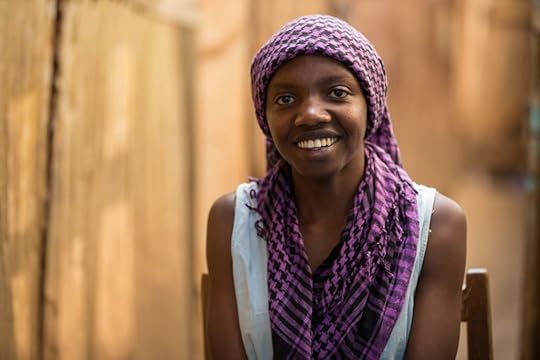

That’s when Eunice found CFK
After connecting with Carolina for Kibera’s Girls Empowerment Program, Eunice found a community of teen moms who were dedicated to bettering their lives. Eunice shared experiences from CFK Safe Space meetings, where teen moms come together and feel comfortable sharing their challenges with each other, but this isn’t your average support group. The girls collectively discuss solutions to challenges presented and trained mentors facilitate conversations around parenting, family planning, health, and more. CFK also helps these young women re-enroll in school so that they can continue their formal education. Eunice has re-enrolled in school and is currently completing form 4, her last year of high school.
“I feel that CFK has done a good job because it has been able to reach a lot of girls who dreams die because they have children”
Those dying dreams are often the result of challenges in schools, that are less than forgiving for teen mothers. CFK also helps these young women re-enroll in school so that they can continue their education. It’s not uncommon for teen moms to be removed from schools in order to discourage their classmates from also becoming pregnant. Eunice shared that moms who do continue their education endure teasing and discrimination from their peers and teachers. Some people even use the term “mother” as a derogatory word and feel that “you [mothers] are not the same as them.” CFK tries to combat this discrimination reinforcing a solid network of support for teen moms. By working closely with school administrators, parents, and mentors, CFK strives to create a system that embraces teen moms like Eunice, in hopes that they all will one day recognize what Eunice knows now, three years after her baby was born, “I have learned that even though I have a child, I have the right to continue my education.”
Eunice’s story is one of many in Kibera and other informal settlements. At CFK we are proud to be supporting girls who balance motherhood and school so diligently as they work toward the next chapter in life. For Eunice, there is no doubt that her future looks bright.
“My name is Eunice and my brighter future is becoming a journalist” – Eunice
The post CFK’s Faces of Brighter Futures | Eunice’s Story appeared first on Carolina for Kibera.
November 12, 2019
Celebrating the First Baby of Tabitha Maternity Center
Every mother wants their baby to have a safe and seamless entrance into the world, but for some this isn’t necessarily the norm. The Centers for Disease Control and Prevention (CDC) stresses the importance of women receiving healthcare services before and during pregnancy to decrease the risk of complications. But what happens when a woman doesn’t have access to healthcare services? According to UNICEF, only 58% of women in Kenya access at least 4 antenatal or prenatal doctors visits, leaving at least 42% of women at a higher risk of pregnancy related complications which can be life-threatening. Gladys Mmboga, a first-time mother from Kibera, knew she wanted to have her baby boy in a health facility, but never anticipated the support system she found at Carolina for Kibera (CFK).
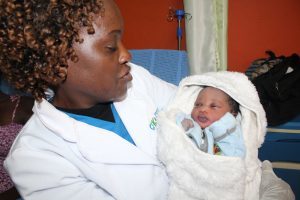
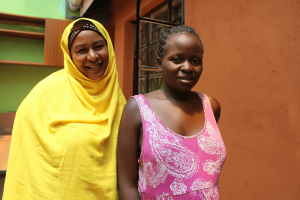
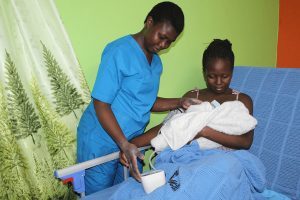
Changing the Maternity Game in Kibera
CFK utilizes a comprehensive network of Community Health Volunteers (CHVs) who identify pregnant women in the community and promptly refer them to Tabitha Maternity Clinic for services. Gladys came to CFK by way of local CHV, Ashya Masoud. Ashya was performing routine house visits in her assigned village when she met Gladys, who was already in her third trimester. Gladys was quickly enrolled in the CFK Maternity Project, which provides healthcare resources to mothers for the first 1000 days of their child’s development (from conception to about two years old).
With the help of Ashya, Gladys received regular antenatal care until September 23rd, 2019 when she experienced severe abdominal and back pain and Ashya quickly referred her to Tabitha Maternity Center for delivery. Unlike women who deliver at home by traditional birth attendants, Gladys was monitored by skilled midwives, reducing her risk of complications even further. Hours later Gladys delivered Ivan, a sweet and healthy baby boy. Weighing in at 3 Kgs (just under 7 lbs) Ivan was given a great chance at an easy entrance into the world because of the diligence of both Gladys and Ashya.
At CFK we are happy to achieve our co-founder Tabitha’s dream of taking care of women and children by ensuring that mothers give birth in quality health facilities attended by skilled health professionals. We celebrate happy outcomes like Gladys’s because we know that there are many who struggle to access healthcare during pregnancy and delivery. In addition to antenatal follow ups, CHVs are trained to identify and prevent home deliveries, avoidable cases of malnutrition, and complications that lead to infant and maternal death.
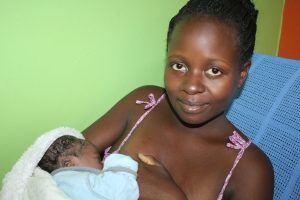
A month after delivery, Gladys is thriving in this new phase of life and baby Ivan is also doing very well! When we asked Gladys if she had any advice for other expectant moms, she told us,
“I would urge everyone to visit Tabitha Maternity Clinic because the facility is accessible, services are timely, and the staff [is] friendly.”
We truly believe that it takes a network of support to bring the next generation into the world. CFK is fortunate to have a mix of dedicated CHVs and skilled healthcare professionals that passionately prioritize infant and maternal health. So today, we applaud all of the moving parts that help healthy moms bring healthy babies into Kibera!
The post Celebrating the First Baby of Tabitha Maternity Center appeared first on Carolina for Kibera.
November 5, 2019
Leave Only Footprints. Create Only Impact.
At CFK we are constantly inspired by the creativity of our supporters and we love hearing “the why” behind the fundraiser. For supporter Jaihind Sumal, donating the proceeds of his memoir was a no brainer,
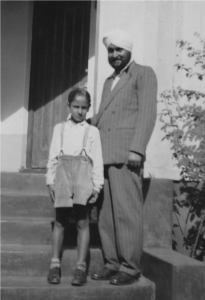
Jaihind and his father Kartar
“From my comfortable retired life, I had to give back to the wonderful people of the country who gave me a wonderful childhood I will never forget. The proceeds from my book on life of Indian migrants in Kenya seemed the best way to do this. After completing the book I looked at charities working in Kibera and CFK provides services that I feel best fits the needs of that community.”
– Jaihind Sumal
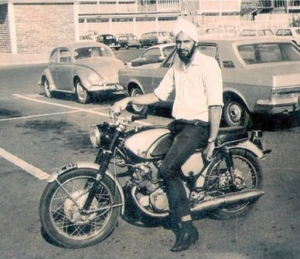
Jaihind on motorbike in Nairobi, Kenya
Born and raised in Nairobi Kenya, Jaihind looks back at his first 22 years of life spent learning and growing in Nairobi with admiration for the opportunities he was afforded, but also vivid memories of those who weren’t so lucky.
He recalled one summer he spent in a Nairobi school for underprivileged students during his college years, tutoring young children, “ It was painful to watch bright and eager students having to interrupt their studies due to lack of money for school fees.” During that summer, Jai remembered that there were few organizations worked to ensure these children had a chance to begin, let alone finish, their education.
After a fulfilling career, Jai wrote his memoir, Leave Only Footprints: Indian Migrants in Kenya. The book leads readers through the experiences of two generations, Jaihind and his father Kartar Sumal, as they strive to find righteousness in a time of turmoil and unrest.
Jaihind is currently offering 100 % of proceeds from the book, currently rated 5.0/5.0 stars on Amazon, to CFK -as an ongoing fundraiser. Thank you Jaihind, for your ongoing generosity and support of CFK programming, and for sharing your “why” with us.
Learn more about fundraising for CFK
The post Leave Only Footprints. Create Only Impact. appeared first on Carolina for Kibera.
October 7, 2019
The Stories of Kibera
Guest writer, photographer, and Nairobi native, Janvika Shah, joined our content collection team this summer to help capture some of CFK’s Stories of Progress. During her time with us she was faced with both devastating realities and awe inspiring resiliency of residents in Kibera.
Volunteering in Kibera was without a doubt the most inspiring and eye-opening experience during my one-month stay in Kenya this summer. As a Nairobi native, I witnessed the city’s pervasive economic inequality from an early age. However, visiting one of the five largest slums in the world gave me an insider look that left me in awe.
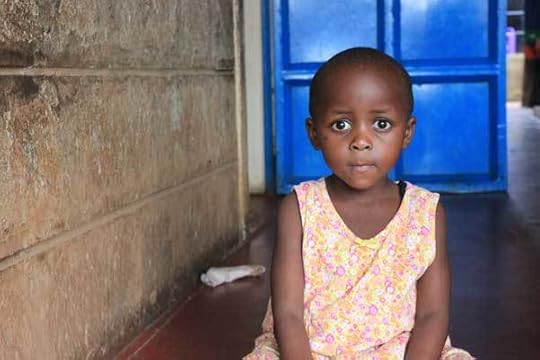
Hundreds of thousands of people are squeezed in a one square mile radius area in Kibera. Many lack basic needs, including sanitary facilities, nutrition and secure houses. Just a few days before my visit, a fire ravaged approximately 20 homes, rendering its residents homeless. While the fire truck arrived in Kibera, it couldn’t make it to the fire as the ‘road’ leading to the neighborhood was completely inaccessible.
I later learned that one of the infants at Carolina for Kibera’s (CFK) nutrition center recently lost her father in an automobile accident and a week later, her house burned down in that fire. I had wondered about her story, as she was the only child whom I couldn’t make smile with my silly faces, play and cooing.
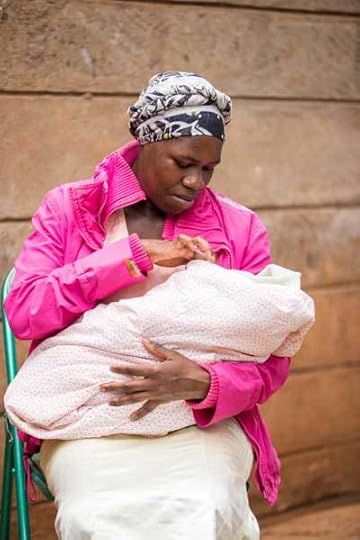
Later that week, I visited CFK’s Tabitha Medical Clinic, a clinic open to all Kiberans and offering services, such as x-rays, ultrasounds, HIV/AIDS testing and counseling, immunizations, and family planning, for an affordable, flat fee. Collaborating with the U.S. Centers for Disease Control and Prevention (CDC), the clinic is staffed by medical professionals that believe in the clinic’s mission to focus equally on prevention and treatment.
While at the clinic, I had the opportunity to meet with a patient, Naomi, 23, who had just given birth to her second child. Her first child was born in 2018 and enrolled in the nutrition center where children at risk for malnutrition spend their days at the center receiving nutrition and care during their most crucial period of development.
Educated by CFK on exclusive breastfeeding, Naomi started breastfeeding right away, so her baby could receive colostrum. Colostrum, the first food breasts make, contains everything babies need to transition to life outside the mother’s body, including antibodies and white blood cells for immunity against diseases and infection.
While she receives additional supplementation from the medical center, she explained that she hasn’t accessed all of the benefits and services from the medical and nutrition center, as her babies’ father didn’t provide consent.
Nonetheless, she was happy that her two babies were getting the nutrition they need and shared her big dreams of them becoming a doctor and lawyer one day. She also expressed gratitude that the centers existed to assist people who can’t help themselves.
Naomi, like many other Kiberans, finds strength and joy in the close-knit community within Kibera. That day, she was accompanied by a friend who was also pregnant and benefiting from the Tabitha Medical Clinic. Naomi explained that many of her neighbors and friends know about the clinic from their conversations.
I always admired the resilience and optimism of the Kenyan spirit. Yet, after chatting with locals and CFK staff, I learned that many of Kiberans choose to stay in the community or return after their studies or travels to help improve living conditions. This was one of the most inspiring and unique cases of ‘strength in numbers’ that I had ever witnessed.
The post The Stories of Kibera appeared first on Carolina for Kibera.
Peter’s Journey to a Brighter Future
As of September 6th, 2019, Peter Opiyo has successfully graduated with a Bachelor of Science in Civil Engineering with second upper class honors and as the first university educated member of his extended family. However, these achievements were no easy feat. In fact, Peter has been working towards this accomplishment since 2006 when he first found CFK.
Peter first came to CFK in 2006 as a participant in Sports for Development’s Caught Offside Project. In 2007 Peter became a peer educator for CFK and simultaneously was granted a scholarship through the Angaza Scholarship Project. Angaza covers 100% of high school tuition fees for qualifying students as well as offering leadership trainings and immersive field trip experiences.
Peter continued volunteering as a peer educator whenever he was home on school holidays. Even though Peter graduated at the top of his class – scoring an A on his final high school exams, he still worried about the next chapter. As the second born in a family of five, Peter was unsure of how he could continue with his university education with few funds available. Determined to make the most of his time, he continued to volunteer with CFK and give back to the community that gave so much to him. During this gap year, Peter learned of the Adobe Youth Voices Project which utilized digital media as a channel for young people to express their art, a perfect fit for Peter – who has been a member of every school choir since high school.


After joining the project in 2014, Adobe Youth Voices called for project beneficiaries to submit their art as well as an essay on what role education played. Out of the thousands of applications submitted Peter was chosen as one of two Kenyan scholars to pursue his university studies.
In addition to being the first university educated member of his extended family he also completed Young African Leadership Initiative (YALI) training and joined the Kenyan boys choir during his tenure at university.
When we asked Peter how it felt to be a college graduate, he told us that “Being in the Civil Engineering class of 2019 and finally graduating is a dream come true.” Ultimately though, Peter is still looking at how he can make the most impact on the community that helped him excel.
”I am now, more than ever, tasked with the great responsibility of making Africa and ultimately the world a better place.” – Peter Opiyo
We are proud to call Peter a part of our CFK family and an Angaza Alumni and are looking forward to what he does next as continues to find his brighter future.
The post Peter’s Journey to a Brighter Future appeared first on Carolina for Kibera.
September 25, 2019
Swapping My Stethoscope for Spreadsheets
My scrubs and stethoscope have yet to leave my suitcase, but even so, I’m confident that my efforts will positively impact the health of Kibera’s children.
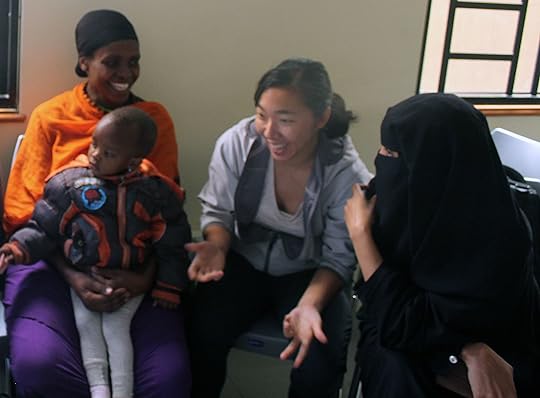
For the better part of the last year, my time has been dedicated to cramming as much human anatomy, physiology, and pathology into my brain as possible. I also learned how to methodically take a patient history and perform a complete physical exam as a first-year medical student. However, over the past three weeks, I’ve set aside my stethoscope and spent most of my time building Excel spreadsheets instead of differential diagnoses.
My mindset in joining the Carolina for Kibera (CFK) team was to jump in wherever I saw a need that I could fill. And within my first few days, I realized that my business degree far more than my one year of medical training would help me have a positive impact during my two months in Kenya. So for the first time in close to two years, I opened up an Excel workbook and brushed the cobwebs off of my VLOOKUP and conditional formatting skills. (Credit goes to the Kenan-Flagler Business School for equipping me with this knowledge as an undergraduate student.)
Since putting my business hat back on, I’ve been pleasantly surprised by how quickly my analytical skills have come back to me. In my first job out of college, I worked as a sales operations analyst at a data-driven marketing and sales company. This role taught me the importance of not just collecting data but ensuring that this data is accessible to those on the front lines. Drawing on this experience, I’ve been working on building a user-friendly database that will help the CFK team easily see growth trends for the children enrolled in their Nutrition Program.
Spending a week shadowing a family medicine physician during my first semester of medical school in the U.S. taught me how critical children’s growth trajectories are in evaluating their overall health and well-being. Each time a patient under two years old came in for a checkup, we recorded the child’s weight, height, and head circumference in the electronic medical record. Then with the click of a button, we pulled up the child’s percentile rank for each of these metrics and graphs showing us the patient’s growth over time relative to the growth expected for a healthy child.
I took for granted that we were saved from countless tedious z-score calculations, not to mention painstaking hand-drawn graphs. Yet these calculations and manual graphs have been a reality for CFK’s nutrition team working to combat the high rates of malnutrition in Kibera for the past five years. However, hopefully this will soon change as we train the team on how to use a new database that automatically computes z-scores and graphs growth trajectories for them.
My scrubs and stethoscope have yet to leave my suitcase, but even so, I’m confident that my efforts will positively impact the health of Kibera’s children. This experience has been a great reminder that pursuing a career in medicine does not mean that my business degree is no longer valuable. In a very tangible way, I’ve seen how my business background can broaden the impact that I can have as a physician, and I’m excited to find other ways to apply these skills during my remaining five weeks in Kenya.
Michelle Ikoma is a first-year medical student at the University of North Carolina School of Medicine and is currently in Kibera for her 2018 fellowship experience.
The post Swapping My Stethoscope for Spreadsheets appeared first on Carolina for Kibera.
#KaribuKenya – The True Spirit of Community Development
Though we came to Kenya and Kibera as outsiders and strangers, we left as friends and family. Without that sense of openness, graciousness, and community that was extended to us from the very beginning, I know that this experience for me would not have been nearly as impactful.

As the mission statement for Carolina for Kibera reads, “CFK exists to develop local leaders, catalyze positive change, and alleviate poverty in the informal settlement of Kibera in Nairobi, Kenya”, all while taking a participatory development approach. Before traveling to Kibera, I was asked several times what participatory development meant to me. A quick Google search will tell you that this is an approach that seeks to engage local populations in development projects. A broad and somewhat vague description, yet a concept that deeply resonates with me.
Coming out of my first year of my Master of Social Work program at UNC, it had been impressed upon me for the previous 8 months that “people are the experts of their own lives”, meaning that no matter how much I may think I know, an individual ultimately knows what is best for their own life and has the inherent right to self-determination. Furthermore, Social Work as a profession stresses that in order to create sustainable, lasting positive change, solutions must be community-driven and that it is our role as Social Workers to facilitate and support that change.
The overlap between Carolina for Kibera as an organization and my values as an individual and future Social Worker was apparent from a precursory look through the website. I knew immediately that being part of such an organization and (hopefully) making meaningful contributions was how I wanted to spend what will likely be my last summer before once again entering the workforce. However, as our departure neared, I began struggling with how I, as a complete outsider to this community, could possibly contribute to such a community-based grassroots organization in a participatory fashion. Sure, the words sound nice, but how was I actually going to live that out?
For many students (myself included), our natural inclination is often to jump right in, heads first, to begin working on projects and creating deliverables for supervisors. As you might be able to guess by now, to do this would be in direct contrast to the mission and guiding principles of CFK. I worked to tamp down this instinct in myself during the first days of work, and instead sought to ask questions, listen to understand, and hear experiences of those infinitely more knowledgeable than myself.
Over the course of my short 8 weeks with Carolina for Kibera, I was fortunate to work in some capacity with nearly every program offered – Maternal and Child Health, Nutrition, Girls Empowerment, and Education. Much of my work here revolved around the development of tools which could be used to monitor the growth and success of these programs, and thus required conversations with program participants at all levels – from program managers to community health workers to community members that would be recipients of these services. I was able to travel to different villages within Kibera to attend educational trainings and community events, and even hosted a training of my own (which would not have been possible without the help of my fellow coworkers!).
Though I learned so much from a professional perspective and am beyond thankful for the numerous opportunities that were presented to put the skills I had been learning in the classroom to use, my greatest lessons in participatory development came from my interactions with the staff of CFK and the community members whom I was fortunate to get to know. From the moment we stepped off the airplane, someone was there to pick us up, show us to what would be our home for the duration of our stay, and answer what I’m sure were our never-ending questions about life and work and culture. They took us to lunch at the best local spots, camping and hiking on the weekends, and football games that won’t soon be forgotten. Though we came to Kenya and Kibera as outsiders and strangers, we left as friends and family. Without that sense of openness, graciousness, and community that was extended to us from the very beginning, I know that this experience for me would not have been nearly as impactful.
CFK has shown me what true participation looks like and this spirit is something I hope to carry with me in all of my future endeavors. I am forever grateful for the opportunity to have lived with, worked alongside, and learned from such an incredible team.
#KaribuKenya
The post #KaribuKenya – The True Spirit of Community Development appeared first on Carolina for Kibera.
September 18, 2019
Inspiring and Tenacious – These are the Mothers of Kibera
For many, motherhood is a time filled with bliss. However, for some it brings about traumatic consequences. Learn how Margaret, Mary, and Juliebeth overcome adversity for the betterment of themselves and their growing families.
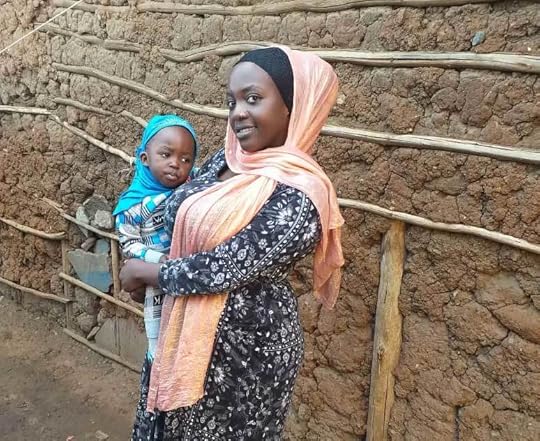
Having a baby is often accompanied by feelings of bliss and unbridled joy and can be an exciting, overwhelming time in a woman’s life – though it’s not always diaper-cakes and baby showers for the women of Nairobi’s informal settlements.
According to UNICEF’s Kenya Profile, the mortality rate of children under five is 4.6% while infant mortality sits at 3.4%. These numbers are devastating, especially when so many deaths are preventable with proper pre-and-antenatal care. It’s easy to create an image of motherhood that is full of baby coos and first steps and forget how lucky many of us are to experience motherhood in safe, clean, and supportive environments.
So today we celebrate all of the moms who did not have the smoothest introduction into motherhood – but are stronger for it. We celebrate the mothers who advocate for themselves and their children to pave the way for a brighter future. Today we meet and celebrate the moms of CFK and what it means to be a mother in Kibera.
Margaret
Margaret’s journey into motherhood was far from conventional. After learning that she was pregnant she spent all of her resources, time and money, trying to provide proper prenatal care for herself and the baby. Shortly after her pregnancy began, it was over; Margaret lost the baby due to a lack of proper medical care.
However, upon discovering she was expecting again Margaret began reaching out to a variety of people – she wasn’t going to lose her baby twice.
“During my second pregnancy I contacted so many sources…” Everyone tried their best to help, but no one could provide the medical care she needed to ensure a healthy pregnancy, “…luckily a good friend of mine told me to join them in one of the care group sessions so that I could hear what they are being taught.”
Margaret’s Care Group is comprised of neighborhood women who promote essential maternal health interventions both in clinics and at home. The group introduced Margaret to the importance of such interventions that contributed to a heathy delivery and better health overall.
Margaret’s determination and commitment to a healthy pregnancy, along with continued guidance from her Care Group provided a safe space for her baby grow into a healthy and happy two-year-old.
Mary
Mary’s life revolves around the wellbeing of her three kids. After 10 years of successfully parenting her two older children she had no concerns when Villance joined the family. Now 19 months old, this vibrant and curious little girl didn’t have an easy introduction into Kiberan life. Mary was certainly aware that her daughter was a little different, “…I could see that she was smaller than her siblings used to be…,” but struggled to hear that her baby was categorized as “severely malnourished.”
Mary and Villance were immediately referred to the Lishe Bora Nutrition Center and placed in a series of educational trainings focused on nutrition. Villance participated in a feeding program at the center and was dropped off every morning for three months. She was provided with adequate nutrition and supplements and monitored by nutritionists on staff to ensure she was hitting appropriate milestones. Villance made strides quickly her mother told us,“…by the third week you could see the strength in her body as she played with other children in the neighborhood.” Meanwhile, Mary was hard at work attending trainings, any trainings she could find – to ensure that she was properly educated in providing a safe, healthy upbringing for her entire family.
Within these sessions, Mary found a community of other parents struggling the same way she was. Parents were referred to other programs within CFK that touched other important health concerns. After three months of intense training for Mary and care for Villance the duo graduated from the center with a clean bill of health! When we recently checked in with Mary and found she was employed at the Lishe Bora Center and taking financial literacy classes to continue propelling her family forward.
Juliebeth
Imagine being expelled from school and kicked out of your home because of a positive pregnancy test. This nightmare became reality for Juliebeth during her third year of high school. At only 16 years old, hopes of a university level education were now impossible and her relationship with her mother has become strained at best.
After being subjected to gossip and ridicule by her peers at school, forced to take a pregnancy test, and subsequently kicked out of the program, Julie thought she had hit rock bottom. “I honestly thought that was my lowest…,” she reflected back on the moments before her mother made her pack her belongings and leave home for good, “…to date I still remember the hurt I felt.”
Luckily Julie’s aunt took her in temporarily and worked to help mother and daughter begin to mend their relationship. Her mother agreed to let Julie move back in on the condition that Julie would cover all of the baby’s expenses – including food. Since the father denied any responsibility Julie was on her own.
When Julie’s daughter was almost two years old, she found consistent work without any hope of going back to school. Her mother had made it clear that education was no longer a priority, so she began cleaning houses and washing clothes to provide for her daughter, “…thus far it has helped me do [what I can] for her and looking at her now I only feel love and joy not the pain and regret I felt initially.”
Eight months ago, after two years of hard work and parenting, Julie was given the opportunity to enroll in school through CFK. Her busy schedule and love of cooking made a vocational skills course in catering the perfect option. Julie is able to work in the evenings and on weekends, while taking classes during the day, securing a better future for herself and her daughter.
Each of these women come from different backgrounds but share one common attribute. Their family comes first – and they are willing to work as hard as it takes to ensure a better, brighter tomorrow for them. That is why we celebrate CFK mothers on this Mother’s Day and every day!
The post Inspiring and Tenacious – These are the Mothers of Kibera appeared first on Carolina for Kibera.
September 12, 2019
The Beginning of a Dream, Lencer’s Story
Lencer Akinyi Onyancha, a devoted daughter and mother, understands the reality of unemployment all too well. Though Lencer is one of the 60% of Kenyan youth that is considered underemployed she didn’t let that stop her from working toward achieving her dream of becoming a Computer Technician. Learn how Lencer overcomes the challenges of being a single mother, supporting her family that is over 8 hours away, and learning to create a new home away from home through Carolina for Kibera.
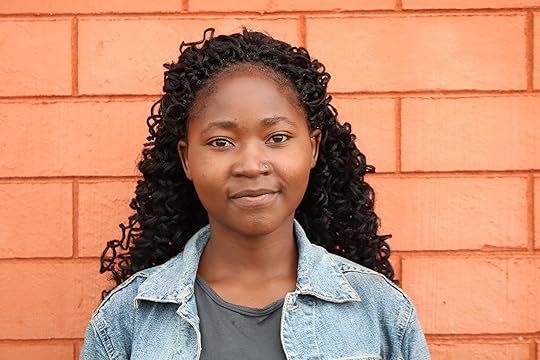
Lencer Akinyi Onyancha – Aspiring computer technician and top of her ICT class is known to her colleagues as a devoted mother, daughter, sister, and mentor who continues to give back to her family and community.
It is no secret that the youth of Kenya are brimming with anticipation to create change and contribute to their communities. Unfortunately, potential and ambition are often not enough to propel young Kenyans into the workforce. In fact, according to the Kenya National Bureau of Statistics, the average rate of unemployment among Kenyans ages (14-24) is at 40% while underemployment stands around 60%.
Lencer Akinyi Onyancha, a devoted daughter and mother, understands the reality of unemployment all too well. After finishing high school Lencer ventured out with her daughter to Nairobi, 8 hours from her hometown, in hopes to make a life for herself while continuing to support her daughter and 6 siblings back in the County of Migori.
However, employment didn’t come quickly or easily. As Lencer thinks back to her early days in Nairobi she remembers the “stress and pressure of being in a big city and expectation of supporting family back at home,” but she didn’t let that stop her creating connections within her community. A local campaign led her to Carolina for Kibera’s Girls Empowerment Program (GEP), which she felt “identified with [her] challenges” and gave her a sense of belonging. Lencer began giving back to CFK almost immediately by serving as a mentor for the GEP, sharing her experiences of being a teenage mother in high school, and providing girls a safe space to work through challenges they faced. Serving as a mentor didn’t only benefit Lencer’s mentees –through mentoring she learned how to overcome many of her own challenges. As she continued leading sessions she opened up about her dream of a career in computer technology.
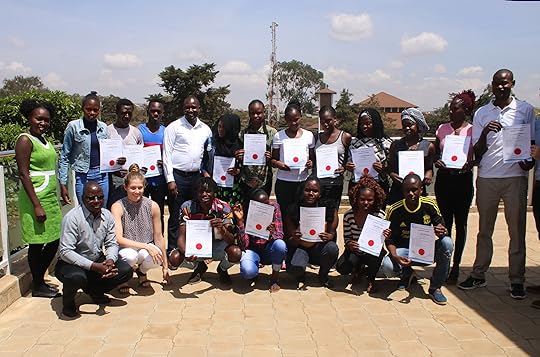
Carolina for Kibera’s most recent ICT Graduating Class
March 2019
Lencer’s work with the GEP led her to enroll in CFK’s Information and Communication Technology (ICT) Program, housed within the Young Health and Wellness Program. The ICT Program is a 4 month intensive that provides a working knowledge of basic computer packages. The program is designed to increase youth employability and entrepreneurship.
Though it started as a dream, Lencer completed the ICT Program, graduated at the top of her class, and is even closer to becoming a computer technician! Looking back fondly on her experiences, Lencer has “enjoyed every minute of [her] time at CFK’s ICT Center”. Moving forward she is looking to pursue an advanced degree specializing in ICT.
At CFK we are grateful for Lencer for giving back to her CFK community and thrilled that we were able to help her begin to pursue her dreams. We are looking forward to seeing what she will do next.
The post The Beginning of a Dream, Lencer’s Story appeared first on Carolina for Kibera.
Rye Barcott's Blog
- Rye Barcott's profile
- 7 followers



